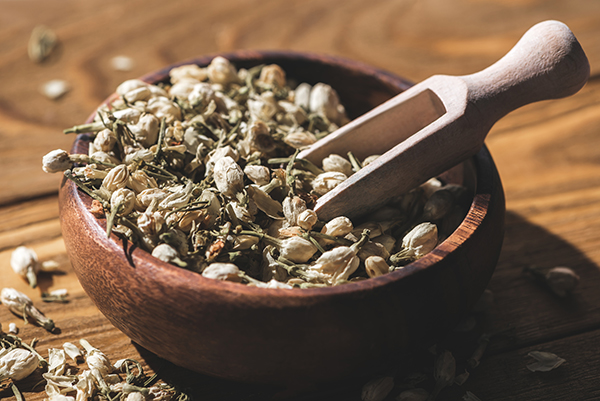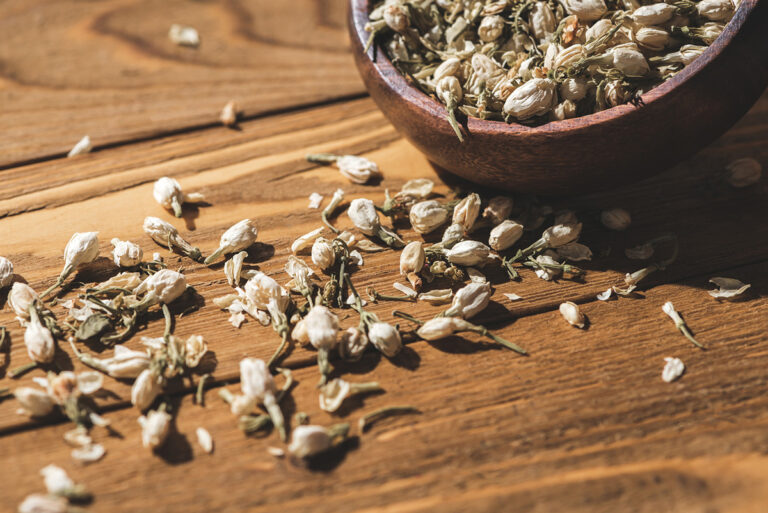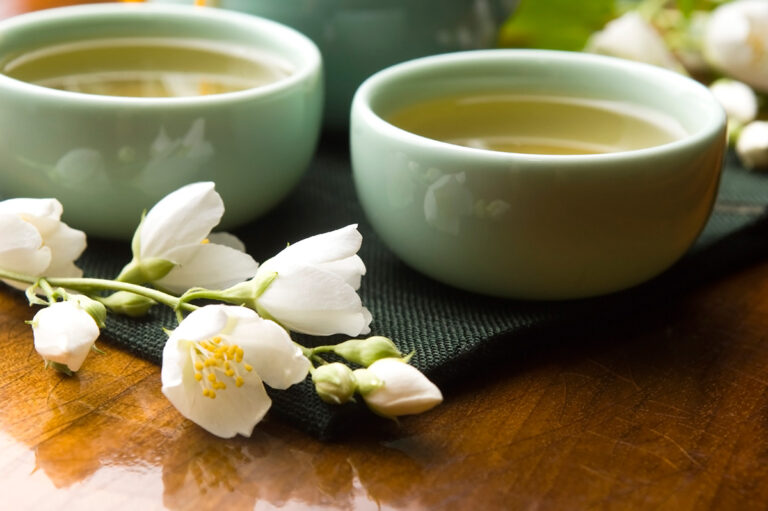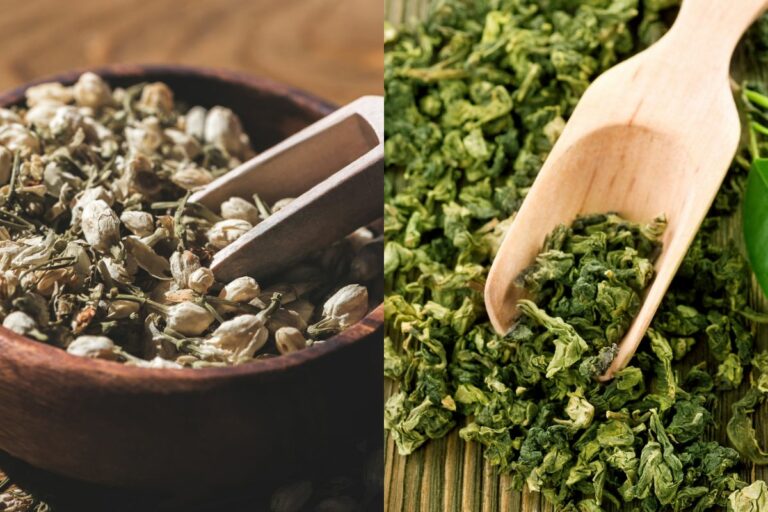Jasmine Tea: Benefits, Side Effects, and How to Make It
Jasmine tea is a popular choice for tea lovers around the world due to its delightful aroma, refreshing taste, and potential health benefits.
In this article, we’ll explore what jasmine tea is, its potential health benefits and side effects, and how to make it. We’ll also answer some frequently asked questions about jasmine tea.

What Is Jasmine Tea?
Jasmine tea is a type of scented tea made by infusing green, black, or white tea leaves with the fragrance of jasmine flowers. The process involves layering jasmine flowers and tea leaves together, allowing the tea leaves to absorb the aroma of the flowers. This process can be repeated several times to achieve the desired level of fragrance.
Jasmine tea is most commonly made with green tea leaves and has been enjoyed for centuries in China and other parts of the world.
Potential Health Benefits of Jasmine Tea
1. Antioxidant Properties
Jasmine tea is rich in antioxidants, particularly catechins and flavonoids, which are known to protect the body against oxidative stress and cellular damage. Antioxidants help neutralize free radicals, which can contribute to chronic diseases and aging.
2. Supports Heart Health
Some studies suggest that jasmine tea may have a positive impact on heart health. The antioxidants present in jasmine tea can help reduce inflammation, improve blood circulation, and lower cholesterol levels, which may reduce the risk of heart disease.
3. Aids in Weight Management
Jasmine tea may help with weight management by boosting metabolism and promoting fat oxidation. This can lead to increased calorie burning and a potential reduction in body fat.
4. Promotes Relaxation
The aroma of jasmine tea has been known to have a calming effect, which may help reduce stress and anxiety. Drinking jasmine tea can also provide a soothing experience, promoting relaxation and mental clarity.
Jasmine Tea Side Effects
1. Caffeine Sensitivity
Since jasmine tea typically contains caffeine, it can cause side effects for those who are sensitive to it. These side effects may include insomnia, restlessness, increased heart rate, and headaches.
2. Allergic Reactions
Some individuals may experience allergic reactions to jasmine flowers or the tea itself. Symptoms may include itching, rashes, difficulty breathing, and swelling of the face or tongue.
3. Interactions with Medications
Jasmine tea may interact with certain medications, such as blood thinners, blood pressure medications, and stimulants. It’s important to consult a healthcare professional if you’re concerned about potential interactions.
Who Should Not Drink Jasmine Tea?
Individuals who are pregnant, nursing, or have a history of allergies or sensitivities to jasmine flowers or tea should avoid drinking jasmine tea.
Additionally, those taking medications that may interact with jasmine tea should consult their healthcare provider before consuming it.
Best Jasmine Teas to Try
There is a variety of different jasmine teas, each with a different tea base and in various forms. If you’re looking for some good options, these are the best jasmine teas you may want to consider.
How to Make Jasmine Tea
To make jasmine tea, follow these steps:
- Boil water to the appropriate temperature. For green jasmine tea, aim for around 175°F (80°C), while black and white jasmine tea should be steeped at 205°F (96°C).
- Add one teaspoon of loose-leaf jasmine tea per 8 ounces of water to a teapot or infuser.
- Pour the hot water over the tea leaves and let it steep for 2-4 minutes for green tea and 3-5 minutes for black and white tea.
- Strain the tea leaves and pour the tea into a cup. Enjoy!
Remember to follow the manufacturer’s guidelines on the packaging if you’re using a branded product.
Final Thoughts
Jasmine tea is a delicious and fragrant beverage that offers a range of potential health benefits, from antioxidant properties to promoting relaxation and heart health.
However, it’s important to be aware of potential side effects and to consult with a healthcare professional if you have concerns about allergies, medication interactions, or other health issues.
FAQ
What Does Jasmine Tea Taste Like?
Jasmine tea has a delicate floral aroma and a slightly sweet, refreshing taste. The flavor profile can vary depending on the base tea used (green, black, or white) and the intensity of the jasmine scent. Green jasmine tea is generally lighter in flavor, while black and white jasmine teas may have a more robust taste.
Is Jasmine Tea the Same as Green Tea?
While jasmine tea is typically made with green tea leaves, it’s not the same as green tea. Both teas carry different flavors, caffeine content, and health benefits. Here’s a detailed comparison between the two.
When Should I Drink Jasmine Tea?
Jasmine tea can be enjoyed at any time of the day. Many people find it particularly soothing in the evening due to its calming effects. However, if you’re sensitive to caffeine, it’s best to avoid drinking jasmine tea too close to bedtime.
How Often Can You Drink Jasmine Tea?
There is no specific limit to how often you can drink jasmine tea, but moderation is key. As a general guideline, you can enjoy up to three cups per day. Be sure to follow the manufacturer’s guidelines on the packaging if you’re using a branded product, and consult your healthcare provider if you have any concerns.
How Long Can You Drink Jasmine Tea Safely?
Jasmine tea is considered safe to consume regularly as part of a balanced diet. However, it’s important to monitor your intake, especially if you’re sensitive to caffeine or have any health concerns. If you experience any side effects or have questions about your jasmine tea consumption, consult your healthcare provider for personalized guidance.



